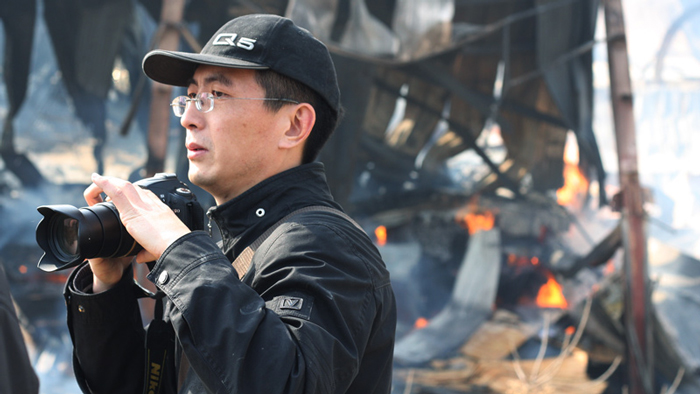

To be a journalist in China you sometimes need to use a few subtle tricks to get your stories to print. Sun Hua, an award-winning investigative journalist for the Jinan Times, knows just what he can and cannot get away with and how best to persuade his bosses to allow him to continue his work.
He is charming, philosophical but also very determined.
This film follows Sun Hua at work as he investigates a story about possible corruption by a property developer, seeking out residents' views, negotiating the demonstrations and dealing with the police. All the time, he quietly considers his position as a journalist in a complex country that itself is dealing with change.
He dreams of 'fairness, objectivity, truth' but he also knows there are real limits to what he can do. Yet he continues to push, to persuade and to publish.
This film explores 21st century China as it is challenged by a changing world,
pushed by free-thinkers such as Sua Hua and an ongoing struggle for increasing freedom of expression.
dir: Ling Lee & Ying Cui, producer: Rodrigo Vazquez - Bethnal Films, camera: Ling Lee, editor: Adam Thomas, composer: Lennert Busch, sound recordist: Bai Yuxun, translators: Aiqin Lin & Bai Xiangwei, postproduction: VET
commissioned for Al Jazeera English Witness
note: We are sorry that this film can't be found online any more due to our protagonists safety.
It was first broadcast on the 7 May 2012.
Here is a review from Vancouver Sun 13 May 2012:
Al Jazeera gets into a bit of fun mischief
Hours after the announcement that its correspondent was being expelled from China,
network airs cutting documentary.
It may have been a coincidence or a small-but-razor-sharp act of revenge.
Either way, it was not only delightfully mischievous,
but an important reminder of
China's increasingly dysfunctional political culture.
A few hours after the announcement that the Beijing correspondent for the
Al Jazeera English-language television network, Melissa Chan,
was being expelled
from China for unspecified reasons,
the channel ran a documentary in its splendid Witness series.
The report told the story of Sun Hua, the idealistic and highly regarded
investigative
reporter for the Jinan Times in the heartland of China's
cultural history, the east coast Shandong province.
The film begins with Sun coming across what is euphemistically called "a road blockage,"
in fact a demonstration by hundreds of people who have no heating in the
brand
new apartment block, are convinced the developer has purposefully
shut off service
to make money and who is, of course, being supported by local officials and the police.
Even these opening clips are very revealing.
We know from several credible sources that there are on average close
to 400
such demonstrations every day by Chinese people exasperated
beyond bearing
with the corruption and disdain for their welfare of the regime.
But most of the stories that come out of China refer to Communist party
officials'
predation on the poor and powerless.
What this Al Jazeera documentary, called Balancing a Dream says is that
China's
rising middle class, the people who have saved enough to buy new apartments,
are just as much targets of the regime's corrupt instincts as are the poor.
The film, made by Ling Lee and Ying Cui, follows Sun as he attempts to get into
his newspaper the story of the apartment dwellers' protest and their dealings
with an undoubtedly corrupt developer.
Sun's prospects are not good. Social unrest is a forbidden subject,
one among
many deemed unsuitable for discussion by the supervisory
Communist
party's Central Propaganda Department.
But Sun retains the idealism and dedication to "fairness, objectivity, truth"
that brought him into journalism in the first place.
He is a very determined young man and he also knows how to play the system.
We see him negotiating with the police at the demonstration and then bargaining
with his editor,
who is just as concerned about the potential negative effect of the
story on advertising
as the wrath of the propaganda department.
Indeed, another revealing aspect of the film is the absolute editorial power in China
of advertisers,
most of whom are linked one way or another to the party and officials.
Sun is idealistic, but he is no fool, and he knows he will have to make compromises
to get a version of the story in the newspaper.
He manages it by encasing the story in the larger framework of a feature article
on how the government and public can solve conflicts.
This is a tactic used quite frequently and to good effect by local journalists
operating in authoritarian states.
They lavish praise on the government for solving some social problem,
and
the authorities don't notice that the real purpose was to expose the
problem that
no one had previously been allowed to talk about.
So Sun eventually got published the basic information about the apartment
dwellers problems using this camouflage.
It is a small victory in a daily contest between the Beijing regime
and its people, but it is a victory.
The global journalism organization, Reporters Without Borders,
ranks China
174th out of the 179 countries in its press freedom index.
And the expulsion of Al Jazeera's correspondent Chan comes as the Beijing authorities
are more and more intolerant of both local and international reporting of stories
the party feels undermine its authority.
Part of the tension comes from the once-a-decade change of Communist
party
leadership scheduled for later this year and early in 2013.
But there are rumours the transfer could be delayed because of the upheaval and
potential for strife caused by the unsuccessful thrust for power by the ambitious
party boss of Chongqing, Bo Xilai, and the embarrassment of the flight to the
United States embassy of detained blind legal activist Chen Guangcheng.
jmanthorpe@vancouversun.com
|

